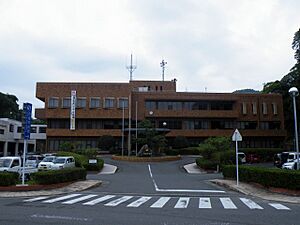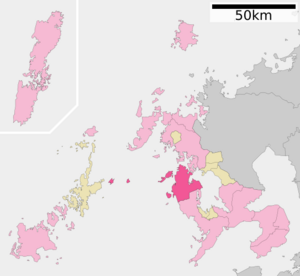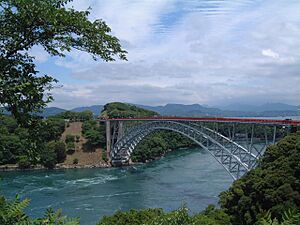Saikai, Nagasaki facts for kids
Quick facts for kids
Saikai
西海市
|
|||||||||||||||
|---|---|---|---|---|---|---|---|---|---|---|---|---|---|---|---|

Saikai City Hall
|
|||||||||||||||
|
|||||||||||||||
 |
|||||||||||||||
| Country | Japan | ||||||||||||||
| Region | Kyushu | ||||||||||||||
| Prefecture | Nagasaki | ||||||||||||||
| Area | |||||||||||||||
| • Total | 241.84 km2 (93.37 sq mi) | ||||||||||||||
| Population
(June 30, 2024)
|
|||||||||||||||
| • Total | 25,184 | ||||||||||||||
| • Density | 104.135/km2 (269.708/sq mi) | ||||||||||||||
| Time zone | UTC+09:00 (JST) | ||||||||||||||
| City hall address | 2222 Seto-kashiura-go, Oseto-cho, Saikai-shi, Nagasaki-ken 857-2302 | ||||||||||||||
| Climate | Cfa | ||||||||||||||
|
|||||||||||||||
Saikai (西海市, Saikai-shi) is a city in Nagasaki Prefecture, Japan. As of June 2024, about 25,184 people live there in 12,447 homes. The city covers an area of 241.84 square kilometers. This means there are about 100 people living in each square kilometer.
Contents
Exploring Saikai's Geography
Saikai is located at the northern tip of the Nishisonogi Peninsula. It is surrounded by water on three sides. These waters include the Goto Sea, Sasebo Bay, and Ōmura Bay. Many islands are also scattered around the area.
Most of Saikai's coast is a ria coastline. This means it has a complex shape with many inlets and bays. The highest point on the peninsula is Mount Nagaura, which is 561 meters tall. This mountain's peak is actually in Nagasaki City. The land from the mountains down to the coast is hilly. It has evergreen forests, cedar and cypress trees, fruit orchards, and farms. There are also some small, flat areas.
Nearby Cities and Towns
Saikai shares its borders with one other major city:
Saikai's Climate and Weather
Saikai has a humid subtropical climate. This type of climate has hot summers and cool winters. The average temperature in Saikai is about 16.6 degrees Celsius. The city gets a lot of rain, averaging 1710.7 millimeters per year. June is usually the wettest month.
The warmest month is August, with an average temperature of about 26.7 degrees Celsius. January is the coldest month, averaging around 7.4 degrees Celsius. The highest temperature ever recorded was 36.7 degrees Celsius on August 21, 2018. The lowest temperature was -3.4 degrees Celsius on February 26, 1981.
| Climate data for Oseto, Saikai (1991−2020 normals, extremes 1977−present) | |||||||||||||
|---|---|---|---|---|---|---|---|---|---|---|---|---|---|
| Month | Jan | Feb | Mar | Apr | May | Jun | Jul | Aug | Sep | Oct | Nov | Dec | Year |
| Record high °C (°F) | 20.7 (69.3) |
21.9 (71.4) |
23.7 (74.7) |
27.0 (80.6) |
29.3 (84.7) |
34.2 (93.6) |
36.5 (97.7) |
36.7 (98.1) |
36.2 (97.2) |
30.8 (87.4) |
25.7 (78.3) |
22.5 (72.5) |
36.7 (98.1) |
| Mean daily maximum °C (°F) | 10.4 (50.7) |
11.6 (52.9) |
14.8 (58.6) |
19.0 (66.2) |
22.3 (72.1) |
24.9 (76.8) |
28.5 (83.3) |
30.2 (86.4) |
27.5 (81.5) |
23.0 (73.4) |
17.8 (64.0) |
12.8 (55.0) |
20.2 (68.4) |
| Daily mean °C (°F) | 7.4 (45.3) |
8.0 (46.4) |
10.8 (51.4) |
14.8 (58.6) |
18.4 (65.1) |
21.6 (70.9) |
25.4 (77.7) |
26.7 (80.1) |
23.6 (74.5) |
19.1 (66.4) |
14.3 (57.7) |
9.5 (49.1) |
16.6 (61.9) |
| Mean daily minimum °C (°F) | 4.6 (40.3) |
4.8 (40.6) |
7.2 (45.0) |
11.1 (52.0) |
15.0 (59.0) |
19.0 (66.2) |
23.3 (73.9) |
24.1 (75.4) |
20.8 (69.4) |
16.0 (60.8) |
11.2 (52.2) |
6.5 (43.7) |
13.6 (56.5) |
| Record low °C (°F) | −2.7 (27.1) |
−3.4 (25.9) |
−2.9 (26.8) |
3.2 (37.8) |
8.1 (46.6) |
12.1 (53.8) |
15.6 (60.1) |
18.6 (65.5) |
12.8 (55.0) |
6.6 (43.9) |
2.9 (37.2) |
−1.1 (30.0) |
−3.4 (25.9) |
| Average precipitation mm (inches) | 63.3 (2.49) |
72.9 (2.87) |
114.3 (4.50) |
142.7 (5.62) |
152.6 (6.01) |
268.3 (10.56) |
262.0 (10.31) |
197.4 (7.77) |
178.5 (7.03) |
98.1 (3.86) |
100.8 (3.97) |
78.6 (3.09) |
1,710.7 (67.35) |
| Average precipitation days (≥ 1.0 mm) | 9.1 | 8.6 | 10.5 | 9.4 | 9.2 | 13.1 | 10.7 | 9.6 | 9.4 | 5.8 | 8.4 | 8.5 | 112.3 |
| Mean monthly sunshine hours | 104.2 | 131.1 | 176.6 | 199.1 | 207.9 | 140.1 | 178.3 | 231.0 | 198.5 | 202.2 | 150.6 | 116.1 | 2,039.2 |
| Source: Japan Meteorological Agency | |||||||||||||
Saikai's Population Changes
According to the Japanese census data, Saikai had 26,275 people in 2020. Saikai has been counting its population since 1920. The city's population was largest in the 1950s, with over 80,000 people.
However, since 1960, Saikai's population has dropped a lot. By the 1970s, it was half of what it was ten years before. By 2020, the population was only about one-third of what it was in the 1950s.
| Historical population | ||||||||||||||||||||||||||||||||||||||||||||||||||||||||||||||||||||||
|---|---|---|---|---|---|---|---|---|---|---|---|---|---|---|---|---|---|---|---|---|---|---|---|---|---|---|---|---|---|---|---|---|---|---|---|---|---|---|---|---|---|---|---|---|---|---|---|---|---|---|---|---|---|---|---|---|---|---|---|---|---|---|---|---|---|---|---|---|---|---|
|
|
|||||||||||||||||||||||||||||||||||||||||||||||||||||||||||||||||||||
| Saikai population statistics | ||||||||||||||||||||||||||||||||||||||||||||||||||||||||||||||||||||||
Saikai's Past: A Brief History
Saikai is located in what was once known as Hizen Province in ancient times.
The modern city of Saikai was created on April 1, 2005. It was formed by combining five smaller towns. These towns were the old town of Saikai, Ōseto, Ōshima, Sakito, and Seihi. All these towns were part of Nishisonogi District. The city hall for Saikai is located in what used to be the town hall of Ōseto.
Saikai's Economy and Industries
In the past, during the Edo period, the towns in this area mainly relied on fishing and whaling. Later, in the Meiji period, coal mining became very important.
Today, the economy of Saikai is mostly based on farming. Products from forests and tourism are also important. On Oshima island, which is north of Saikai and near Sasebo, there is a large shipyard. This shipyard, called Oshima Shipbuilding, builds large ships and metal structures. Sumitomo Heavy Industries owns part of this company.
Education in Saikai
Saikai has many schools for children and teenagers. The city government runs 11 public elementary schools and six public junior high schools. For older students, the Nagasaki Prefectural Board of Education operates three public high schools. There is also one special education school for students with disabilities, run by the prefecture.
Getting Around Saikai: Transportation
Railways
Saikai does not have its own train station for passengers. The closest train station is Sasebo Station. You can travel between Saikai and Sasebo Station by bus.
Main Roads
The city is connected by important national routes:
 National Route 202
National Route 202 National Route 206
National Route 206
Saikai's Sister City
Saikai has a special friendship with a city in Australia:
 Bowen, Queensland, Australia
Bowen, Queensland, Australia
See also
 In Spanish: Saikai (Nagasaki) para niños
In Spanish: Saikai (Nagasaki) para niños





